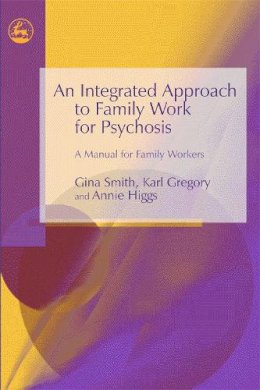
An Integrated Approach to Family Work for Psychosis: A Manual for Family Workers
Gina Smith
An Integrated Approach to Family Work for Psychosis is a manual for using cognitive behavioural approach to working with families of people with severe mental illness.
The authors, all experienced clinicians, discuss the various core components of family work, including what constitutes family work, when it might be offered, and how and where it might be applied. As well as these core concerns, the authors also look at reframing challenges and overcoming common personal and external barriers to effective family work. Each chapter can be read individually or as part of the integrated manual. The central argument of the book is that family work must be individualised and it offers a clear approach to engaging and working with families to ensure that this happens, including guidance on how to link components of a service user's plan with their family's strengths and strategies for reducing stress. The book addressed both theory and practice, and concentrates on the experience of mental illness for the service user and their family, providing a focus for intervention.
Exploring family work as an integrated psychosocial and educational support strategy, this manual will increase the confidence and competence of new family workers - mental health workers, social workers, psychiatrists, psychologists - and broaden the knowledge of those already working in the area.
Product Details
About Gina Smith
Reviews for An Integrated Approach to Family Work for Psychosis: A Manual for Family Workers
The British Journal of Psychiatry `It covers the what, why, who, where and how of family work. Appendices give useful examples of information sheets, assessment formats and a glossary…This is an excellent addition to any mental health practitioner's library and one I will be recommending to colleagues.'
Nursing Standard, Vol.21, No.39, June 6-12 2007 `This is a practical manual for family work in psychosis designed for professionals with interest but limited experience in the area. Drawing on their own extensive experience, the authors provide a clear and well-structured guide to implementing their approach.'
The Psychologist `This manual provides a clear account of the process of family work in psychosis. It is written by three nurses with extensive experience of working with families affected by psychosis and training other healthcare professionals to do so. It is a practical guide which describes how these practitioners have translated this evidence-based approach into routine practice…The primary strength of the manual is its attention to the practitioners of undertaking family work. It will be an extremely useful resource for nurses and other mental health professionals; particularly those who are completing training in family work. It will be an extremely useful resource for nurses and other mental health professionals; particularly those who are completing training in family intervention. I am sure it will become recommended reading for psychological intervention training courses…This is a very good introduction to family work which should enhance the potential of mental health staff to help families affected by psychosis.'
Mental Health Practice, Vol.10, July 2007 The authors admirably achieve their stated aim of covering the what, why, when, who, where and how of family work with service users experiencing psychosis and their families. They provide a book that would be a really useful aid to any practitioner involved with service users who are experiencing psychosis. It presents up to date information in a readily accessible manner and guides the worker through the therapy process with a service user and their family
Clinical Psychology Forum
